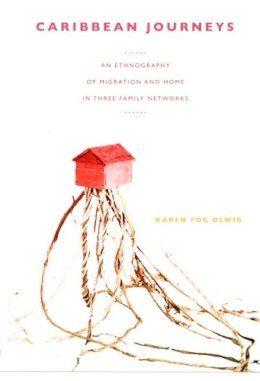
Caribbean Journeys: An Ethnography of Migration and Home in Three Family Networks
Karen Fog Olwig
The migratory journeys of the families in this study began more than sixty years ago, when individuals in the three families left home in a British colonial town in Jamaica, a French Creole rural community in Dominica, and an African-Caribbean village of small farmers on Nevis. Olwig follows the three family networks forward in time, interviewing family members living under highly varied social and economic circumstances in locations ranging from California to Barbados, Nova Scotia to Florida, and New Jersey to England. Through her conversations with several generations of these far-flung families, she gives insight into each family’s educational, occupational, and socioeconomic trajectories. Olwig contends that terms such as “Caribbean diaspora” wrongly assume a culturally homogeneous homeland. As she demonstrates in Caribbean Journeys, anthropologists who want a nuanced understanding of how migrants and their descendants perceive their origins and identities must focus on interpersonal relations and intimate spheres as well as on collectivities and public expressions of belonging.
Product Details
About Karen Fog Olwig
Reviews for Caribbean Journeys: An Ethnography of Migration and Home in Three Family Networks
Silvia Domínguez
American Journal of Sociology
“Karen Fog Olwig presents a profound ethnographic study of three transnational Caribbean families. . . . As she describes the nuanced and colourful lives of her participants, it becomes evident that Olwig’s study transcends the fundamental migration related experience. . . . Caribbean Journeys is a valuable contribution to migration literature.”
Terry-Ann Jones
Ethnic and Racial Studies
“This study of three families’ respective histories of migration from the Caribbean holds many points of interest both for Caribbeanists and for those concerned more generally with migration studies. There is also something here for students of identity politics, both in the UK and in the USA. . . . [An] ethnography of extremely dense and rich transnational relations.”
Diane Austin-Broos
Journal of the Royal Anthropological Institute
